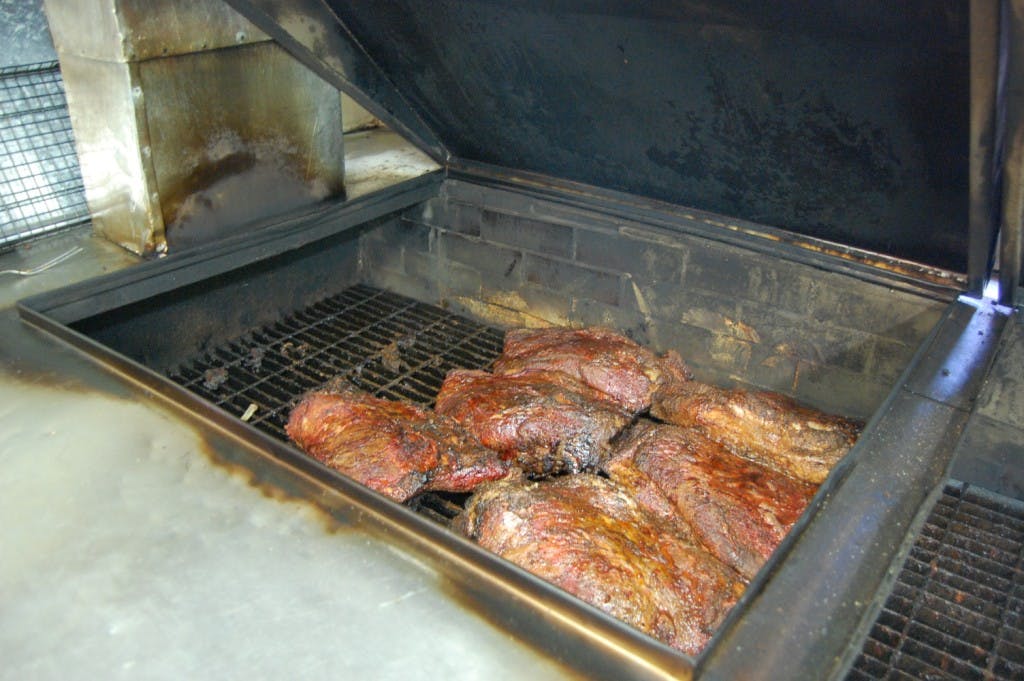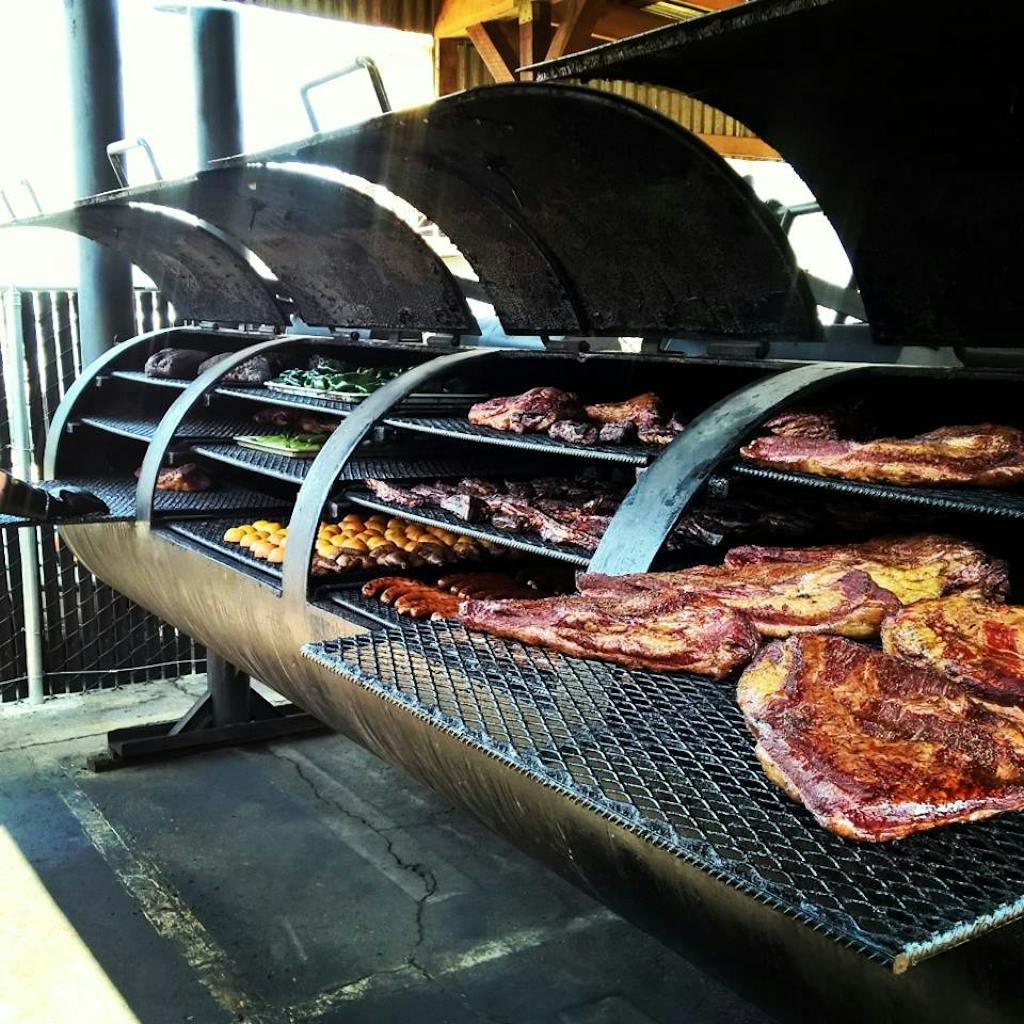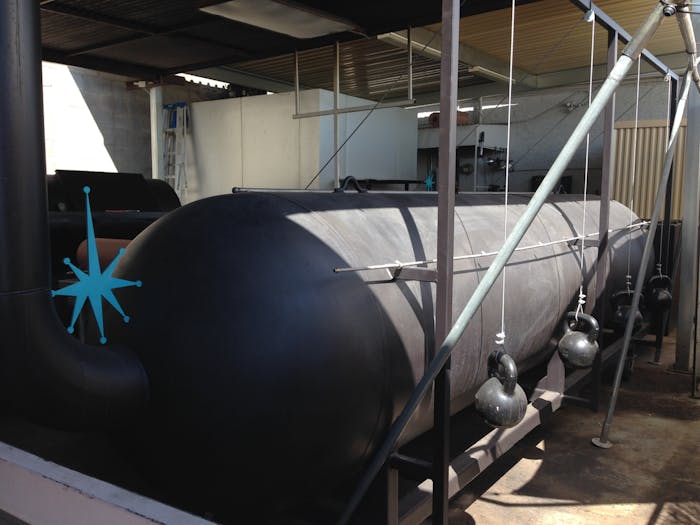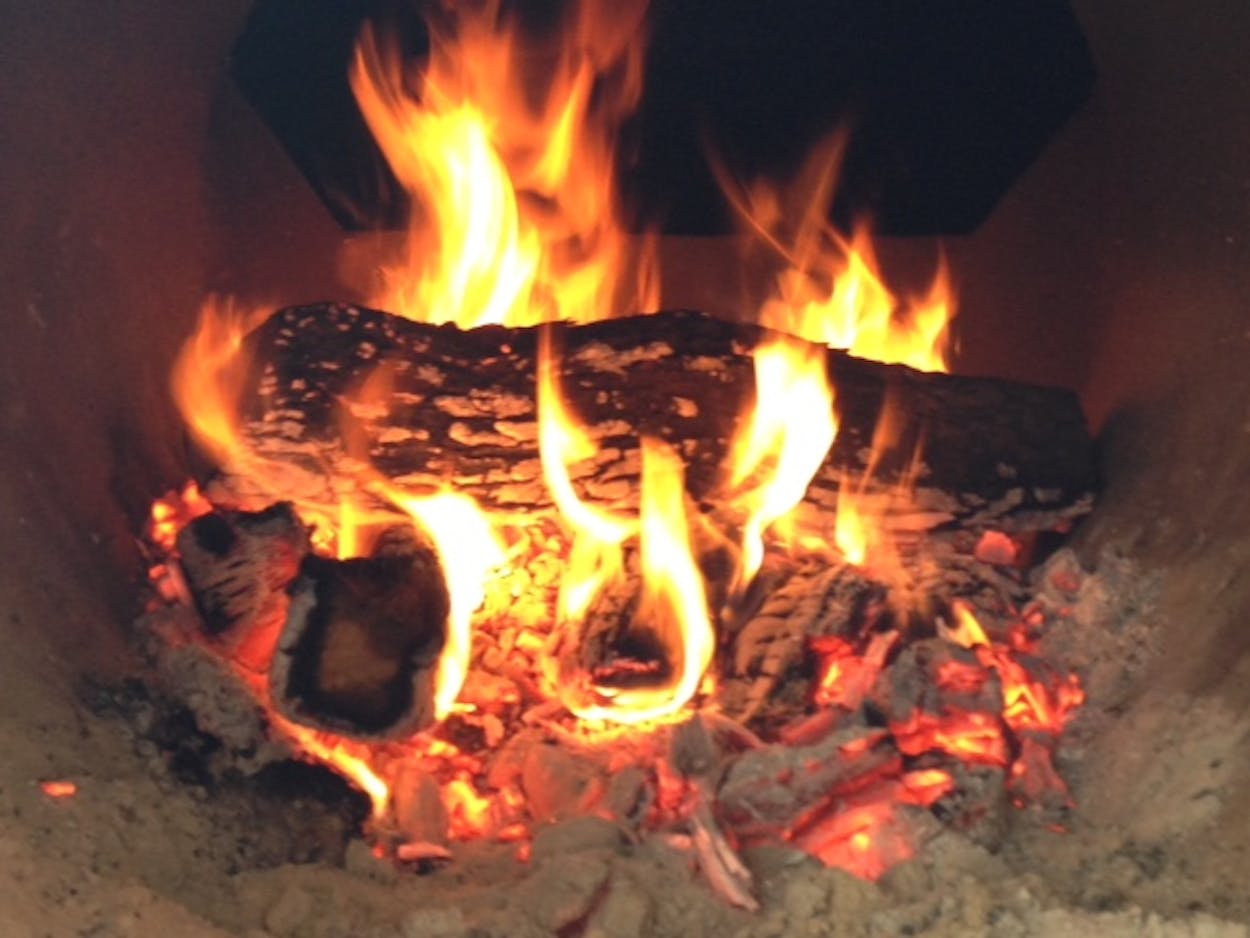It’s hard to find a city of consequential size in the country that hasn’t seen a new barbecue joint open recently. The craft is more popular than ever, and restaurateurs are taking note. With this boom comes an increased awareness that great barbecue demands the type of smoke that only wood produces. In bustling metropolises like New York or Seattle, local pitmasters load briskets into offset smokers, not those fully contained gas contraptions. But fires, even contained ones, mean navigating city codes and ordinances, perpetuating an idea that only long-established barbecue joints operating under some sort of grandfather clause can still cook on wood-fired barbecue pits. But that’s just not accurate.
Earlier this year, Robert Moss, a food writer from South Carolina discussed this widely-believed myth in an article that included a challenge from the founders of True ‘Cue (an organization whose purpose is “to celebrate and to promote barbecue’s wood-cooking heritage”). They offered a modest prize to anyone who could “provide an actual citation or the name and title of any government official who had ever forbid a restaurant to cook with wood.” Last week, Moss says he hasn’t seen a name offered up, and True ‘Cue founder John Shelton Reed said in the year since the challenge was issued, “We have had no takers.” He added that “no one cited anything or anyone who forbade wood-cooking.”
Still, the fallacy gets repeated. In a recent article on The Federalist, barbecue writer Johnny Fugitt attempts to get the public riled up about heavy-handed barbecue regulators. “Overregulation is slowing job creation and business growth,” he cries. That might leave a lot of barbecue owners scratching their heads wondering why there isn’t a dearth of out-of-work kitchen help scrambling for those ever-dwindling barbecue joint jobs. Pitmasters are in high demand, and a good one is hard to find in this current barbecue craze. Jack Perkins of the Slow Bone in Dallas told an audience at a recent Dallas panel discussion that his pitmaster has “a third grade education and makes $60,000 a year.”
Fugitt’s article is constructed around the fictitious barbecue joint Freddy’s BBQ in the popular House of Cards television show. “The sad truth is that Freddy’s could simply not exist in DC or in most major cities today,” is the pity-party premise supposed to tug at our barbecue heartstrings. Fortunately for barbecue lovers, Fugitt’s hypothesis is a load of horse brisket. Just ask Daniel Delaney of BrisketTown in Brooklyn who opened his joint in 2012 and proudly cooks with all wood; or Billy Durney in the Red Hook neighborhood of Brooklyn, who started smoking meats there in 2013 and just added a duo of wood-burning offsets to his fleet of smokers. Even DCity Smokehouse, established in Washington D.C. in 2013, uses a wood-fired smoker. Health departments aren’t shutting them down. If a supposed grandfather clause was required to cook with wood, they’d have never been able to open in the first place.
These grandfather clauses are usually unofficial agreements between a permitting entity and a business owner. They’re rarely defined on paper because they come with a wink and a nod and are at odds with the most current health or building codes. Such a grandfather clause is generally given to historically significant restaurants to allow them to operate as they always have.
I recently talked with Tim Taylor, the general manager at Pizzitola’s. They have a brick pit inside the kitchen at their historic Houston restaurant, and it is often cited as the prime example of a grandfathered pit. Taylor confirmed that Pizzitola’s has been told by the health department that they cannot make significant changes to the barbecue joint without endangering the validity of the current grandfather clause. He calls the pit “our biggest burden and the thing that sets us apart.” He wouldn’t want to replace it because it is iconic. “On any given day, fifteen or twenty customers get their photo taken in front of the pit.” But the part about the grandfather clause is a bit murky. “No one [from the city] has ever said ‘Let me come out and define it specifically for you.'” The pit itself always becomes the focus of the clause for Pizzitola’s, but the wink and the nod are just as much about the lack of fire separation and fire suppression around the pit as it is about the box where the meat is cooked. If a roaring fire in their brick pit was in a separate building instead of within just a few feet of their dining room, Pizztola’s might not need a grandfather clause at all.

Why does this myth persist? First, its sounds great. It gives “real” barbecue more cache for seeming endangered. The promulgates the romantic notion that when a pitmaster dies or barbecue joints closes, another in a finite number of wood-cooking establishments is permanently shuttered and none can replace it. It’s a juicy-sounding nugget in the sometimes misunderstood narrative of heritage barbecue, and one that sounds plausible. Fugitt, a budding writer who just published a book about his 100 favorite barbecue joints in the country, fell prey to this assumption, but he’s certainly not alone. The “grandfather clause” exemption, or blaming of the health department gets thrown around frequently as an easy excuse for any number of shortcuts in quality by restaurant owners. Sometimes they’re right, but it’s a vague excuse that needs to be questioned more often.
It’s also a fallacy perpetuated by those who find the false impediment beneficial to their choice of using gas smokers. A barbecue joint like the Boar’s Nest in Seattle can cry on the shoulder of a journalist saying it’s not their fault they use gas. In this case, Fugitt notes that the Boar’s Nest “is making do with smokers the city has deemed acceptable.” But what about Jack’s BBQ in the same city? Jack Timmons (full disclosure, Jack is a friend) had to work with the same Seattle permitting offices and the same health department, but proudly uses two wood burning offset smokers that sit outside of his ten-month-old restaurant. The city must have deemed them acceptable or he wouldn’t be open.

To be sure, convincing the permitting authorities can be a challenge. Scott and Bekke Holmes of Little Miss BBQ told the city of Phoenix about their plans to cook barbecue in offset smokers and sell out of food every day. They nearly got laughed out of the building on day one, but they persevered. Now they’re cooking with all wood, and the city of Phoenix got an education in wood-cooked barbecue. The Holmes have now paved the way for their future barbecue competition, but they proved that getting permission to do it the hard way isn’t out of reach. Even in the Carolinas, so heralded for whole hog cooked over wood, you’ll hear those cooking with gas use the excuse that new joints simply can’t use wood. Yet The Pit opened in the middle of downtown Raleigh in 2008 using all wood, and in Greenville, North Carolina, a new barbecue joint–Sam Jones BBQ–will cook hogs over wood coals because gas wasn’t ever an option in their minds. Good barbecue has never been about going down the path of least resistance anyway.

When the health department asserts their authority at a barbecue joint, it’s rarely about wood. Like the recent shut down at Tarheel Q in Lexington, North Carolina, the reason the health department gets involved in barbecue is for food poisoning, not the choice of cooking fuel. In his article, Fugitt notes that “Many owners shared with me that their businesses are hampered by local environmental, safety, and health regulations.” That is true, and so are all restaurants. Those cumbersome regulations are what is supposed to keep acid out of the iced tea. If Fugitt believes those same regulations are aimed at keeping wood out of the pits, he’s getting hoodwinked.
Here in Texas, our cities are having a barbecue renaissance. Nothing but wood fuels the pits at new barbecue joints all over Dallas, Houston, San Antonio, and Austin. Austin’s city government even gave a recent vindication to those using wood burning pits by refusing to pursue a proposed ordinance regulating wood smokers. It’s never been easier to cook with wood in the city.
Back at Pizzitola’s, I wondered what kind of smoker they’d pursue if they were starting from scratch knowing the challenges of the brick pit, which can be expensive to operate (cost of wood, insurance, etc.). Taylor who is intimately familiar with the Houston health department said “we’d love to be able to put our briskets in an Oyler pit.” A smoker that runs on wood.
I offer the same challenge as Robert Moss and the fine gentlemen with True ‘Cue. I’ll send an autographed copy of my book, The Prophets of Smoked Meat, to the first person who sends me the name of a city official that has denied a building permit or threatened to shut down a restaurant simply because the cooking method was a wood smoker.* Otherwise, so forth and cook like your grandfather did, with wood. No excuses.
*Permits denied because of the smoker location, lack of fire separation, lack of fire suppression, lack of required roof/enclosure, or other violation of health codes will not be considered.








